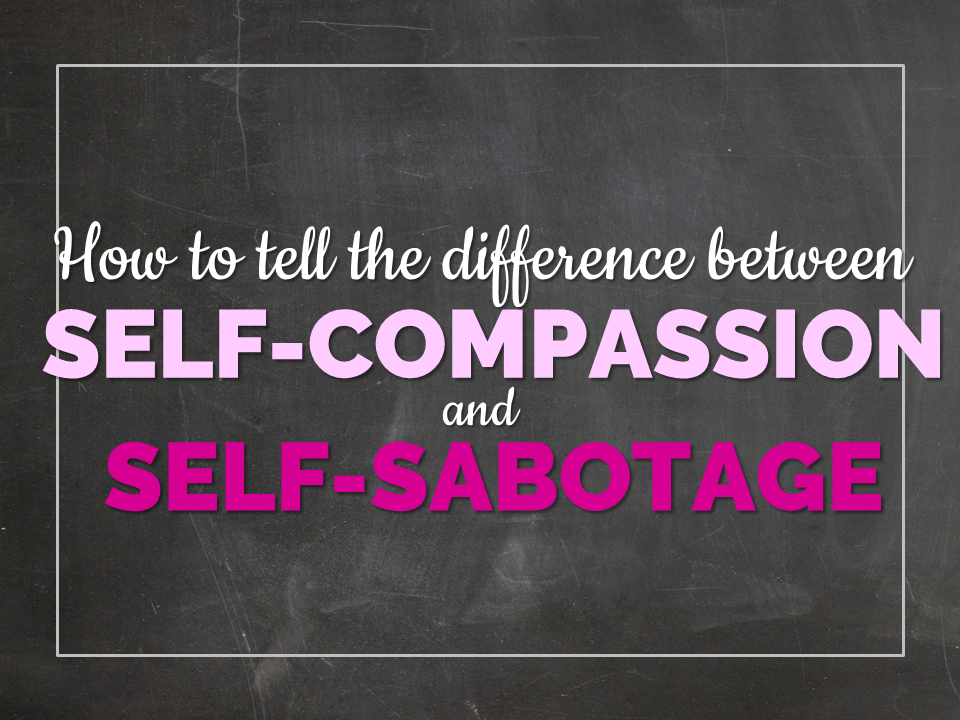Self-compassion and self-sabotage.
They sound like two very different things, but we easily confuse them.
Like when you find yourself sitting in front of the tv, with a bowl of ice cream, after a long, hard day of work.
Is that self-sabotage or self-compassion?
To know the difference takes awareness.
So, check in with yourself.
Ask yourself if the behavior is coming from a place of care and love. (Self-compassion)
Or if it’s coming from a place of “I don’t care,” or “I deserve this.” (Self-sabotage)
To make it even more clear, you can ask yourself two simple questions:
- Am I repeating this behavior regularly? If yes, then…
- Is this behavior causing me more harm than good?
If your answers to both questions are YES, then you’re likely self-sabotaging.
On the flip-side, if you’re engaging in a behavior that’s helping you feel good without negatively affecting your goals, then you’re likely practicing self-compassion.
Now, let’s explore each of these more closely…
Self-Sabotage
You may already be well acquainted with this behavior.
I know I am.
It very much undermines my goals and plans.
And it’s something I see not only in myself, but very often in my clients, too.
When they come to me, they’re frequently self-sabotaging by eating or overeating foods they didn’t intend to eat, or by skipping workouts, or by staying up way past their bedtime.
Here are the general behaviors of self-sabotage:
- Procrastination
- Not showing up
- Quitting
- Over-indulging… Not just in food but also alcohol, shopping, surfing the net, and Netflix
Yes, Netflix.
That’s my self-sabotage method of choice.
I know I do it.
It’s an emotional thing.
A hit of numbness when I have things to do.
It’s plain procrastination.
With a hint of over-indulgence.
Now, when you understand the mind, you know that you crave that which is easy and comfortable.
Easy and comfortable can be very hard to resist.
Your very biology wants it.
So how do you overcome it?
Overcoming self-sabotage
The temptation to self-sabotage is everywhere.
You’re surrounded by so much entertainment, food, alcohol, and stuff to buy.
Self-sabotage is easy.
Figuring out what’s triggering your self-sabotaging behavior is the critical part.
A clue: It’s never the object of temptation itself.
So, it’s not the cookie, the wine, the diversion, or the new pair of shoes.
It’s the feelings that lead you to give into those temptations.
And it’s the thoughts you’re having that lead to those feelings.
So, become aware of your thoughts and feelings.
Get curious.
Write stuff down.
Notice when you’re self-sabotaging, and ask yourself questions.
When you get curious, you’re likely to notice feelings of deprivation, exhaustion, unworthiness, or incompetence.
And when you dig deeper, you’ll find the thoughts or beliefs that make you feel that way.
Frequently, as a coach, I hear things like:
- “I had a tough day and was so tired”
- “I just really wanted it, even though I knew I shouldn’t”
- “I always screw things up”
The saboteurs are never the food, the alcohol, or the Netflix.
Those are just the soothers.
The real saboteurs are your thoughts and feelings.
Clue into those, and you’ll be able to leave self-sabotage behind.
Self-Compassion
Now, all that being said, if you’re self-sabotaging, have some self-compassion.
Love yourself anyways.
Choose to be kind rather than mean.
It’s through kindness that you’ll have the energy to improve.
Self-compassion fills you up, it doesn’t tear you down.
It’s doing what makes you feel good, without derailing you in any way.
Some great ideas for self-compassion are:
- Practicing mindfulness
- Encouraging yourself
- Comforting your body
- Writing yourself a love letter
Sometimes self-compassion is home-made soup.
Sometimes it’s a moment to breathe.
And sometimes it’s talking to yourself in gentle words.
There are no right ways to self-compassion.
There are no “shoulds.”
Self-compassion is just showing yourself some understanding as you recognize the suffering you’ve been through.
You’ve done the best you could do to keep yourself safe and happy.
You are human.
And you deserve to be treated with humanity.
Self-sabotage and self-compassion are different.
But, in the moment, they both feel good, especially when you’re suffering.
The difference comes in the next moment.
Self-compassion never leads to regret, guilt, or beating yourself up.
It will only lead you to feel better.
And make better choices moving forward.
Debbie
P.S. Do you want to end your self-sabotaging ways, and practice more self-compassion? I can help. Just email me at debbie@debbieharbeccoaching.com or book a time to talk about your next steps.


